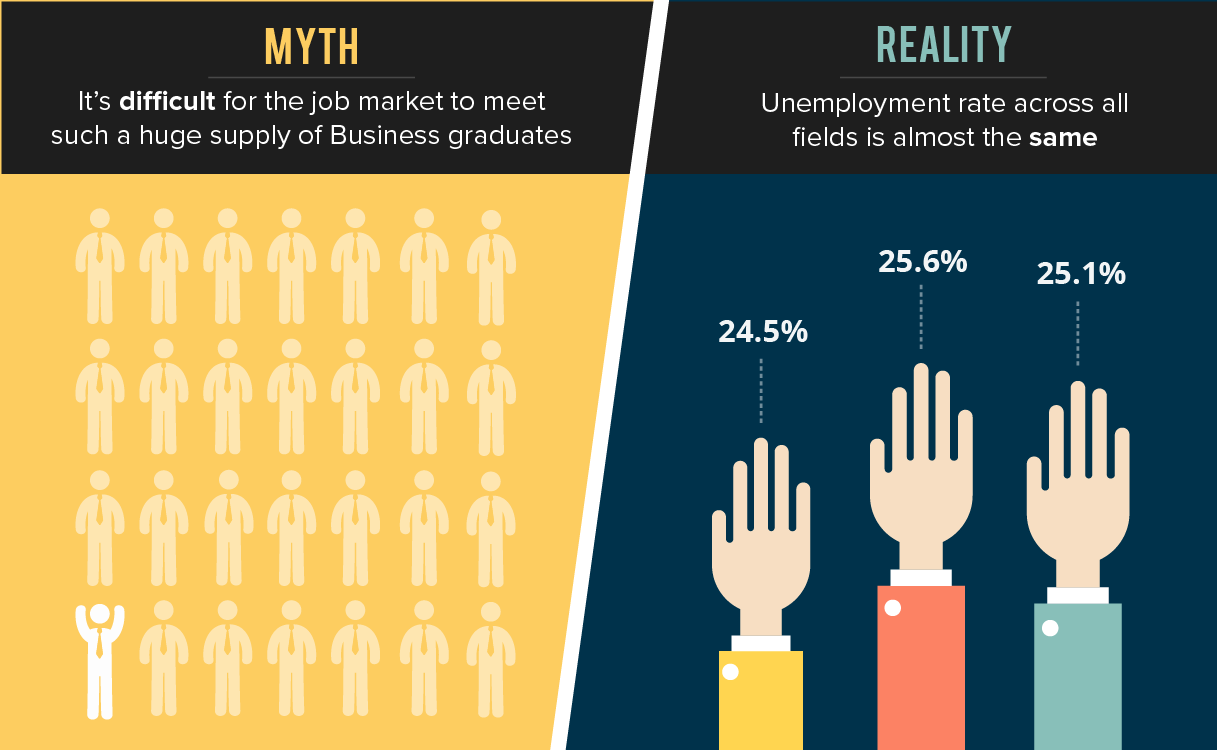7 Biggest Myths about Business Degrees Everyone Keeps Talking About
If you've been told off for your desire to pursue a Business degree before, then read on as we clear the air on some of the common misconceptions and myths about Business Degrees.
Updated 20 Apr 2020


Tell anyone that you want to study Business and you are likely to be bombarded by a hurricane of discouraging remarks.
“You’re wasting your time studying Business.”
“A Business degree is useless.”
“There are no jobs for Business graduates.”
Sounds familiar?
If you are contemplating on studying a Business degree but find yourself agonising whether it is right for you because of all the lies stories of unemployed business graduates, fret not.
Find out the truth behind these 7 most common misconceptions and myths about Business degrees and silence the critics once and for all.
#1. A Business degree is useless because it is too general
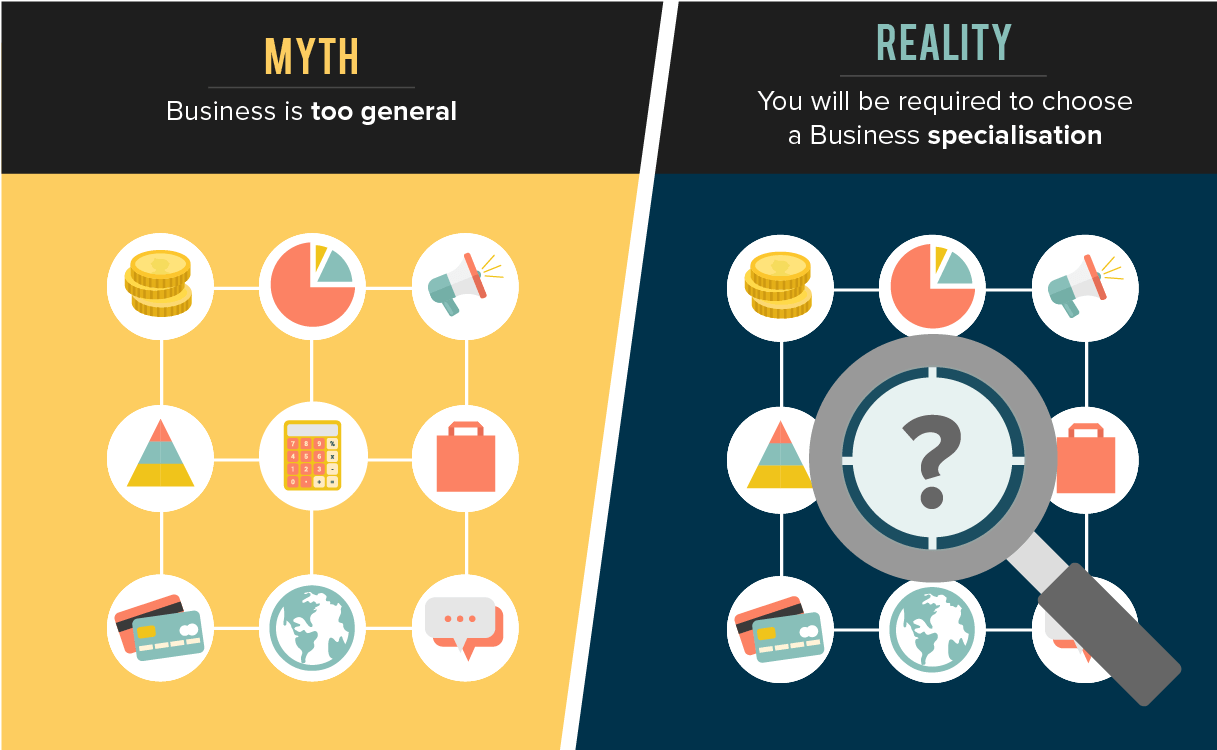
Myth:
There is nothing much you can learn from a Business degree unless you are majoring in Accounting. Business is too general and it is not worth your time.
Reality:
With so many subfields within Business, it is easy to see Business as this huge buffet with a variety of sample courses where you get to taste everything without committing to anything.
The reality is that many universities will require you to choose a Business specialisation as part of your Business degree. Whether it’s Finance, Accounting, Human Resource, Economics or Marketing, these specialisations (or majors) will provide you with in-depth knowledge about a specialised field.
After all, organisations have many interrelated business functions, so it is practical to expose Business students to a number of subjects before narrowing down to an area of interest.
Moreover, many other undergraduate degrees can be perceived to be broad too. Think Psychology, where you will need to pursue a Masters to be a psychologist, and Biomedical Science, which also requires a postgraduate qualification if you want to do research work.
No degree can fully encompass all the knowledge you may need in a particular field. A degree is merely a stepping stone, giving you a solid foundation in preparation for your career ahead.
#2. You must be very money-minded & want to be a billionaire
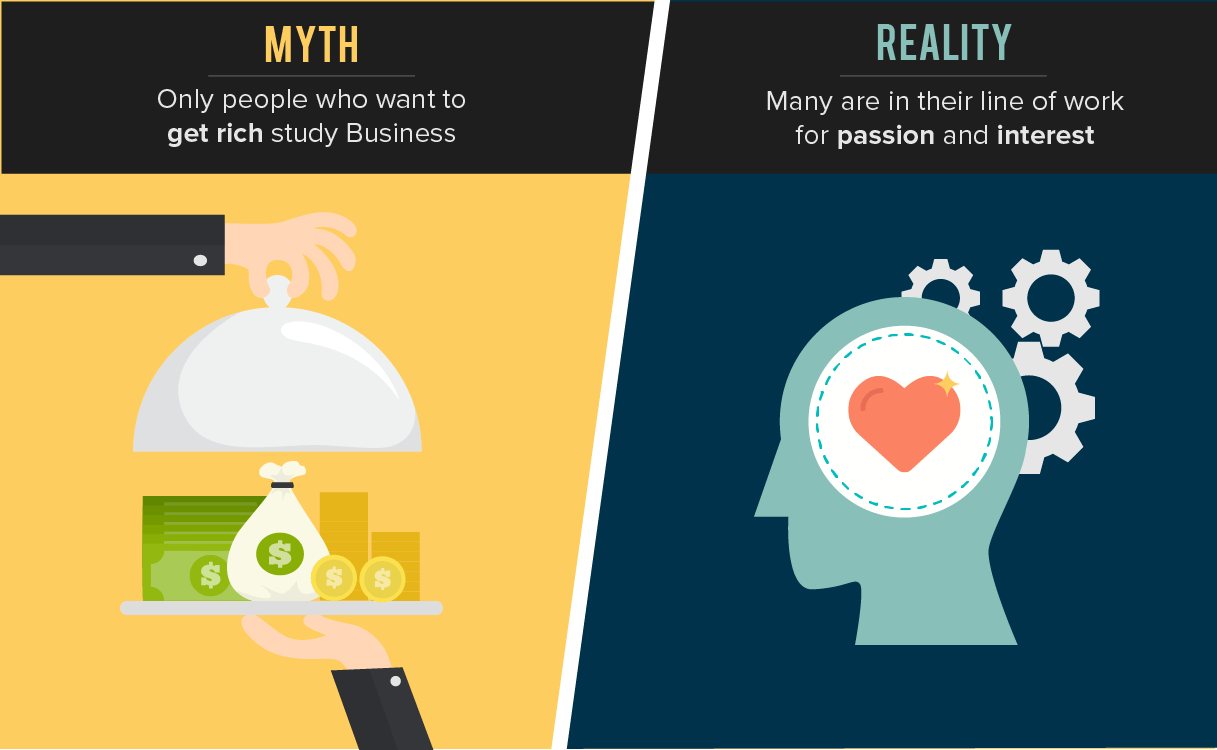
Myth:
Only people who want to get rich study Business and you must have the desire to own a business empire.
Reality:
Studying Business does not mean that you will be magically equipped with the skills and knowledge to be the next Tan Sri Tony Fernandes. Neither does it mean that making money and being a business mogul is all you care about.
Business comprises of a wide range of fields and it does not mean you will be the next Jack Ma with a Business Degree. Here is a taste of some of the options you can pursue in Business.
- Human Resources Management, to manage people in organisations
- Marketing, to research about markets and convey the value of products and services
- Economics, to recognise multiple factors that may affect a business
- International Business, to manage multinational companies and ventures
- Business Psychology, to help businesses by using social and behavioural science
None of these necessarily hold the magic pill for you to be an instant billionaire.
And surely, many professionals are in their line of work for passion and interest – whether it is to revolutionise and create organisational change (HR), to experience the thrill of promoting a newly launched product or service (Marketing) or to help people invest in the stock market (Finance).
Bottom line: Business is not only for those who want to start their own businesses.
DID YOU KNOW
HELP University is one of the few universities in Malaysia that offer ‘Business Psychology’. A one-of-a-kind course, this programme combines management studies with the critical and analytical methods of psychology to help improve working life in organisations. It is a great choice if you are interested in pursuing a career in human resource, training & development, and employee and customer relations.
#3. You must not be very smart if you want to study Business
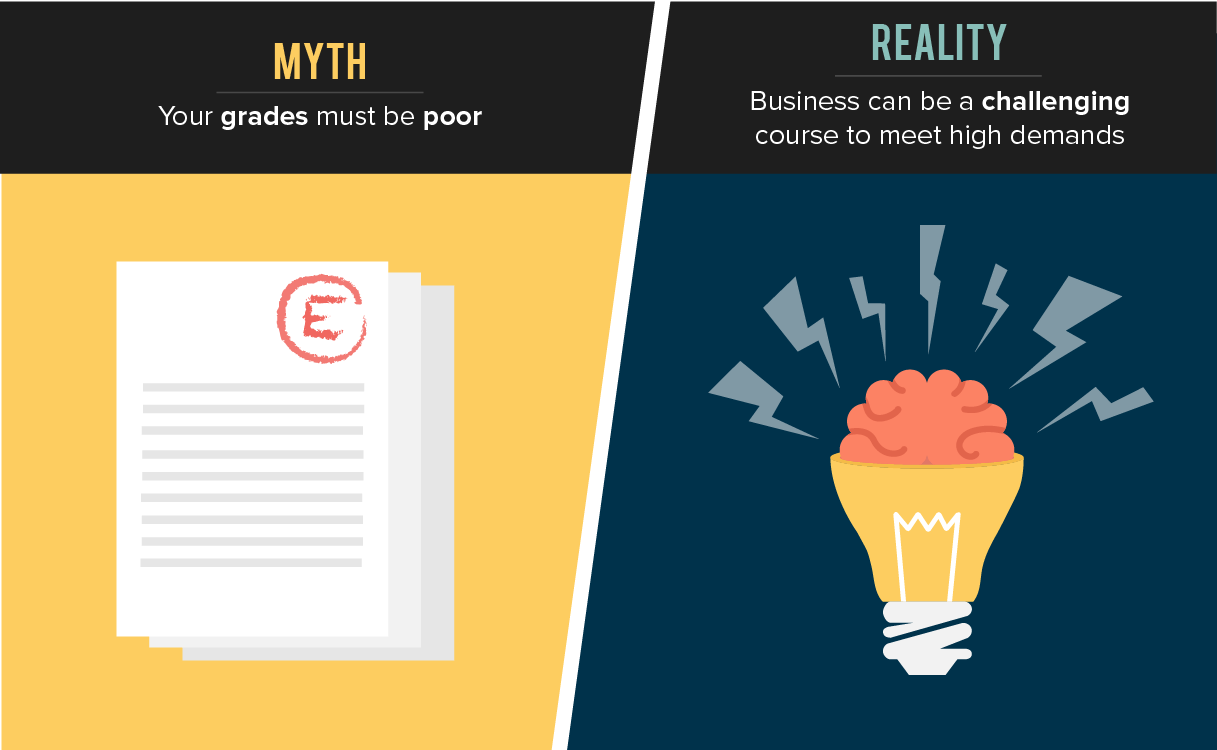
Myth:
If you are considering Business, your grades must be poor. You probably didn't have other choices so you have to settle for a Business degree.
Reality:
Cultivated in secondary school where students with better grades are given priority to enter Science stream, there is a general perception that Business degrees are for academically weak students.
And if you are a stellar Science student with a string of A’s, entertaining the thought of pursuing a Business degree is an invite to a thunderstorm of disapproval and criticism.
“You’re completely wasting your grades!” is what you will probably hear all the time.
The truth is that Business can be a challenging course, and universities with strong Business programmes have stringent entry requirements to ensure students are able to cope with the high demands.
In fact, certain universities demand as much from their Business students as they do from Science students. University of Melbourne requires an ATAR of 85.00 for a Bachelor of Science, but has an even higher requirement for their Bachelor of Commerce at an ATAR of 95.00. The same goes with University of Warwick, which stipulates A*AA for an Economics degree, but only requires AAA for its Mechanical Engineering course.
The fact that these universities have such lofty expectations from their Business students is a testament to the fact that Business is certainly not just a course for the academically-challenged.
#4. Business is one of the easiest courses out there
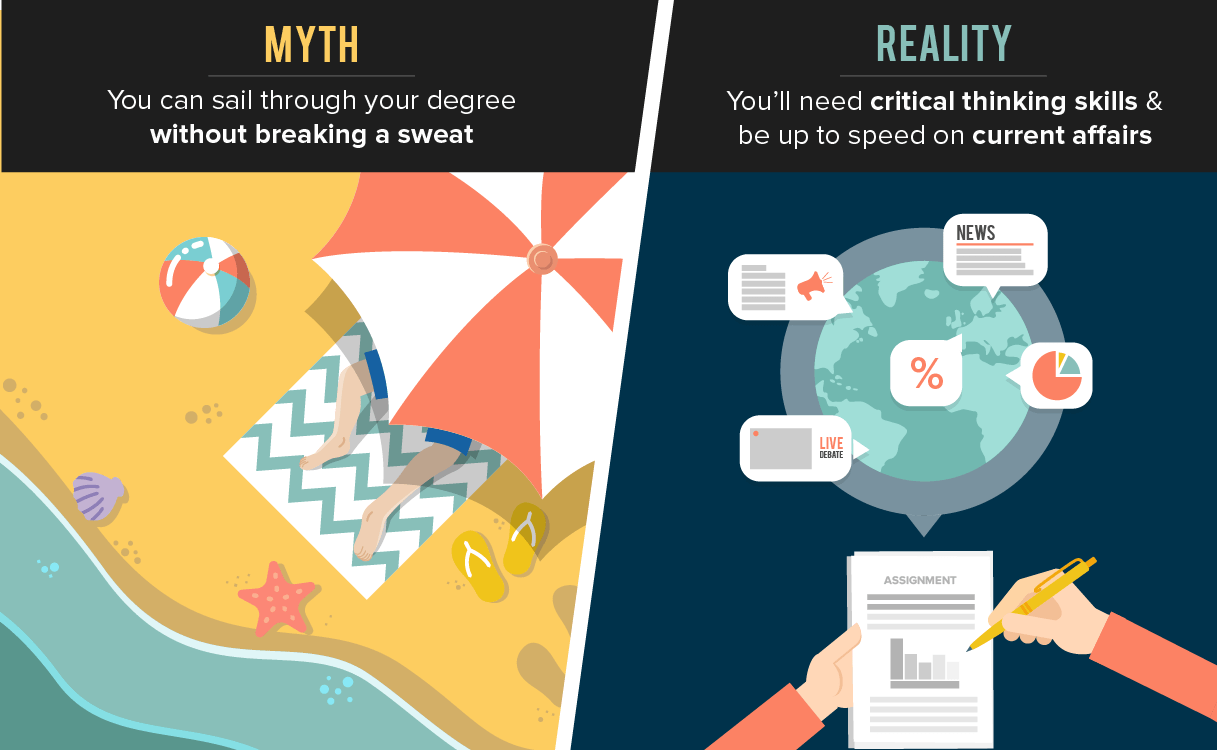
Myth:
If you want to sail through your degree without breaking a sweat, you should study Business. It is so easy, you can probably graduate with a 1st class with almost no effort at all!
Reality:
It may appear to be so — until you get a real taste of how rigorous business school can be.
Business is a course where there aren’t necessarily any right or wrong answers.
What are the economic consequences of the Brexit referendum?
What are the best strategies to market the new iPhone?
How do you stay on top of your competitors?
Unlike in Science, where 2 parts hydrogen and 1 part oxygen will always give you H₂O (and any other response is asking for a big red cross), the answers in Business may not be as clear.
Not only that, with business environments constantly changing, you are expected to be up to speed on current affairs and trends for class assignments and projects. Imagine having to apply various theories and concepts that you have learnt to real-life settings and working with a mixture of people who may or may not have the same views as you do.
Doesn’t sound so easy anymore, does it?
Yes, it may not be as academically demanding as a Medicine degree. Yes, you could probably squeak by with a pass without lifting a finger throughout the entire course. But if you are looking to get the most out of your Business course, then you will find it as challenging and interesting as any other course can be.
#5. No recognition from foreign universities and companies

Myth:
If you are planning to pursue a Masters or a Ph.D, your local Business degree won’t be recognised by universities abroad. You won't be able to work overseas either since all you have is a Business degree.
Reality:
This perpetuating myth of unrecognised degrees, particularly in the Business field, needs to be stopped.
The truth is that many countries do not have a single, central authority that grants recognition of overseas degrees, whether for study or employment.
Singapore, for example, specifically states that they do not have a list of accredited overseas universities, and leaves it to the employers to make hiring decisions. Australia, on the other hand, has many organisations that assess overseas qualifications, but these are primarily for licensed professions like medicine, law and engineering.
For jobs that are not governed by a professional body, qualification evaluation is typically not necessary and is left to the judgement of employers. And if you are planning to pursue postgraduate studies or transfer to a university abroad for 1-2 years of your degree, your eligibility will be determined by the individual universities themselves.
So what does this mean for you?
The key is to ensure that the university you attend is a genuine institution. Check that it is accredited by the Malaysian Qualifications Agency (MQA) and find out their ratings in MyQUEST (for colleges) and in SETARA (for universities). Look for institutions that have a good track record in producing graduates, as well as those with extensive partnerships with foreign universities.
DID YOU KNOW
HELP University has partnered with over 160 universities across 14 countries globally. Have peace of mind knowing that their dedicated Student Placement Services team can facilitate your applications for universities abroad and advise you on available scholarship opportunities.
#6. Your job options will be limited to mundane cubicle jobs
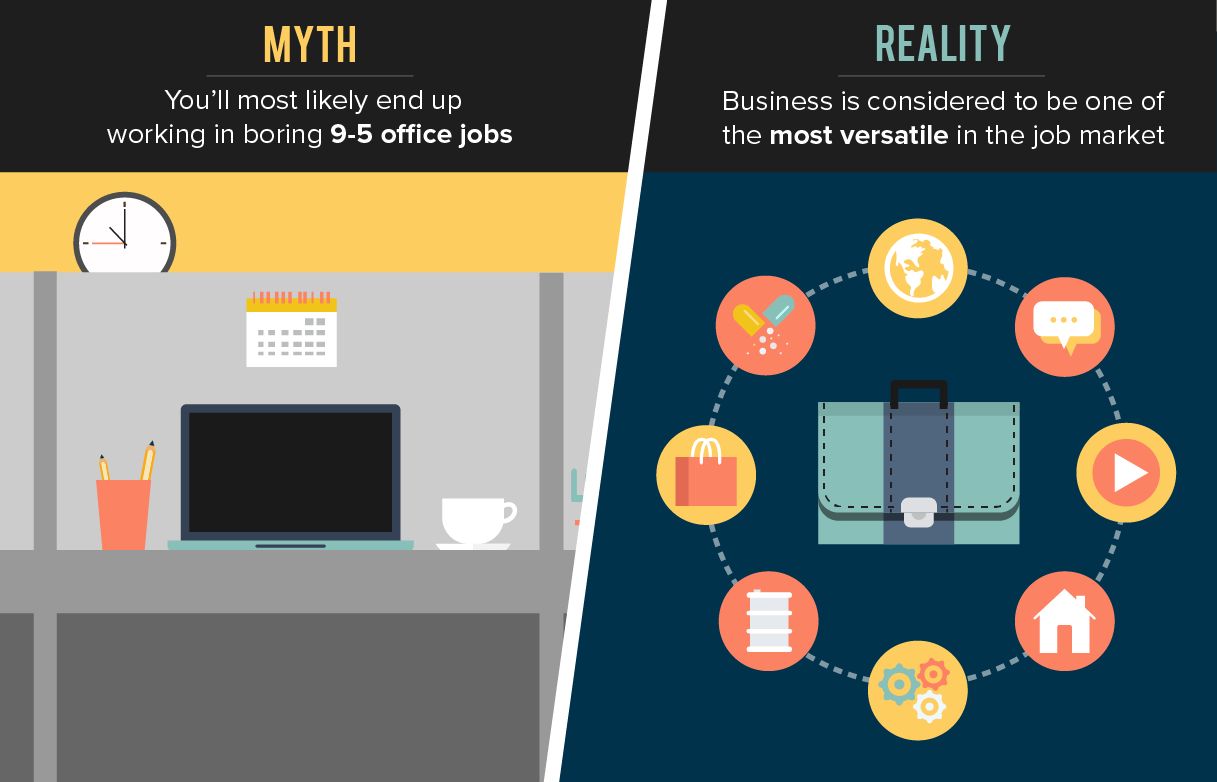
Myth:
There aren't many career opportunities for Business graduates. You will most likely end up working in mind-numbingly boring 9-5 office jobs.
Reality:
Yes, you will work in mundane cubicle jobs — but only if you choose to.
Unlike Law, Medicine or Engineering graduates, there are no clear career paths for Business degree holders, which makes the world your oyster.
Without question, Business graduates are considered to be one of the most versatile in the job market, as they can be employed in various fields in a wide range of industries.
You can be sure to find Business students everywhere, working in major industries from oil & gas, construction and plantation to healthcare, logistics and education. You can choose fun and exciting jobs (media and creative), fast-paced and ever-changing jobs (startup), professionally-inclined jobs (finance and banking) or constantly on-the-go jobs (sales).
Your options are bountiful because a Business background provides you with the fundamental knowledge and skills on how to innovate and adapt in modern business.

#7. You will face a lot of competition in the job market when you graduate
Myth:
There are so many Business graduates these days. It will be difficult for the job market to meet such a huge supply of graduates. You’ll probably end up sad and jobless.
Reality:
It is true that the majority of unemployed fresh graduates are made up of students from the Arts & Social Science field, but that is because they make up the largest pool of students in Malaysia. Therefore, the largest number of employed graduates are in the Arts & Social Science field as well.
Based on the Ministry of Higher Education's Graduate Tracer Study 2014, the percentage of unemployed Arts & Social Science graduates is actually the same as Science and Technical graduates, hovering at approximately 25%.
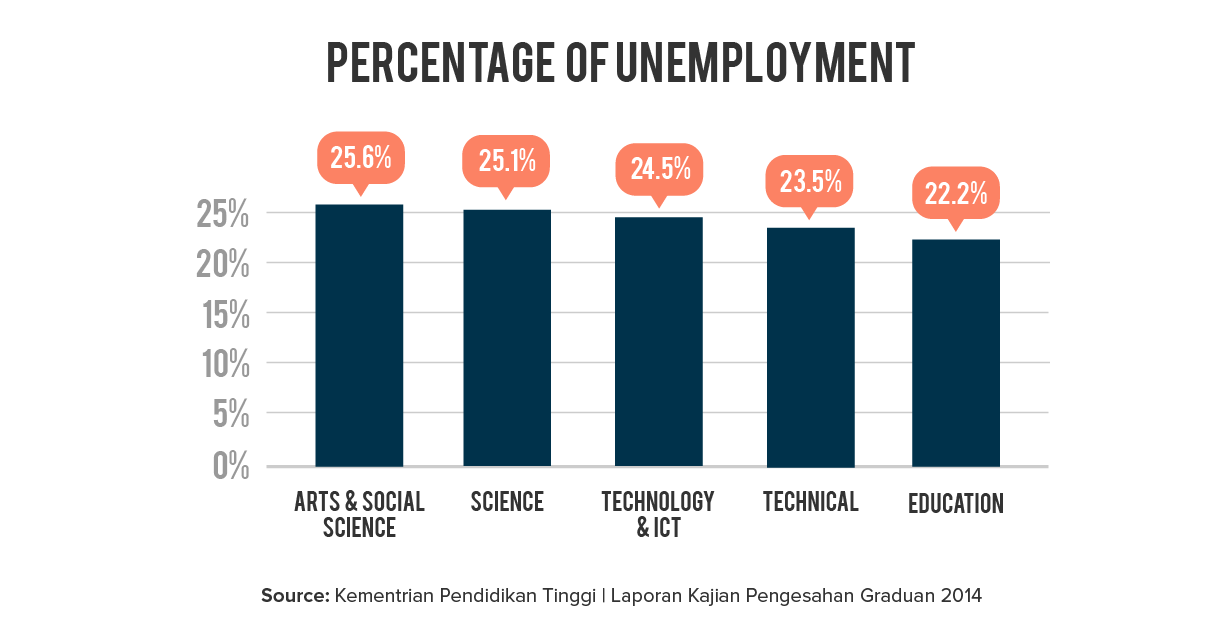
As you can see, the unemployment rate across all fields are almost the same, with Education having only a slight edge over the rest.
Ultimately, what course you pick doesn't really matter. At the end of the day, what determines your success is not the piece of paper you have when you graduate — it’s you!
DID YOU KNOW
Students from HELP University are constantly involved in prestigious internships and graduate training programmes with leading multinational companies (MNCs), such as KPMG, Ernst & Young, Unilever, BDO and General Electric. This can work wonders in enhancing your CV for your job hunt when you graduate!
Now that we have debunked some of the most common myths about Business degrees, you can now take that leap if you were previously sitting on the fence. We may have even given you some firepower to counter your busybody excessively passionate friends and relatives who take joy in criticising your choice of degree.
Strive to choose a course that you’re both passionate and happy about, because otherwise, nothing in your course will make any sense to you. After all, you should be studying to amplify your knowledge in a field you’re interested in, and not what other people think you should be interested in.
